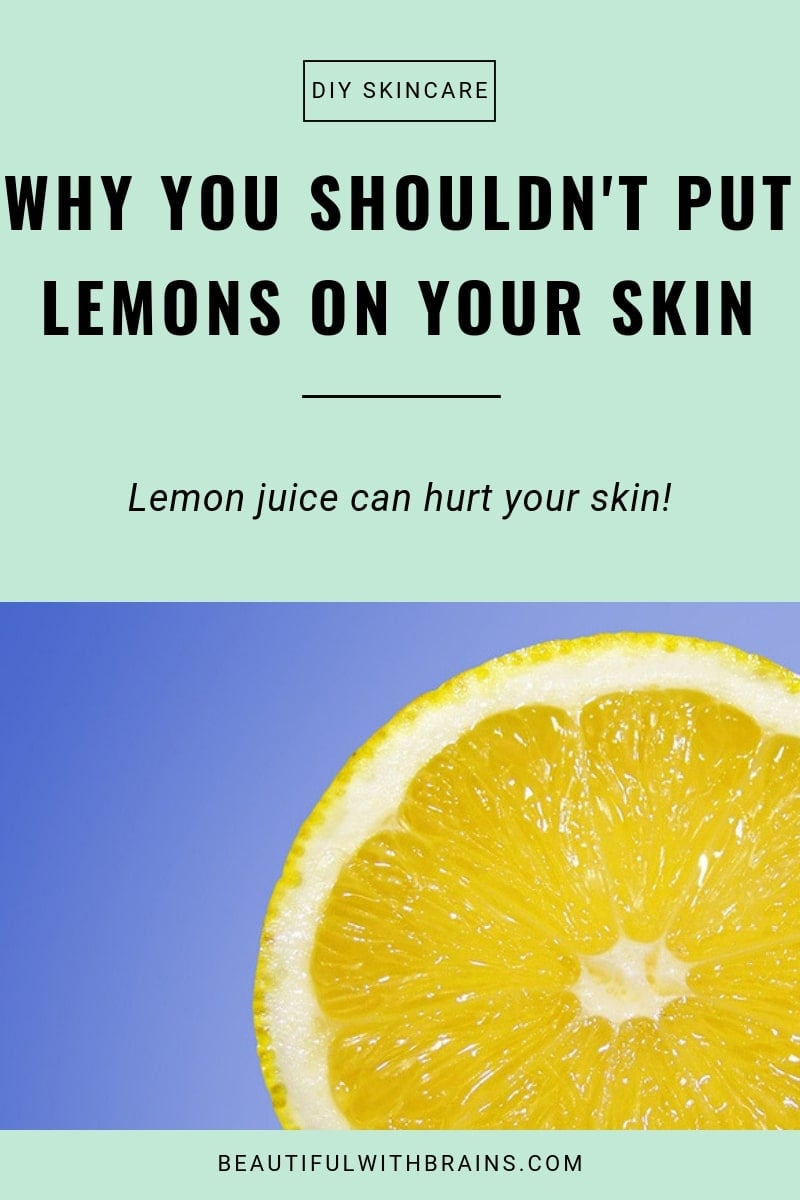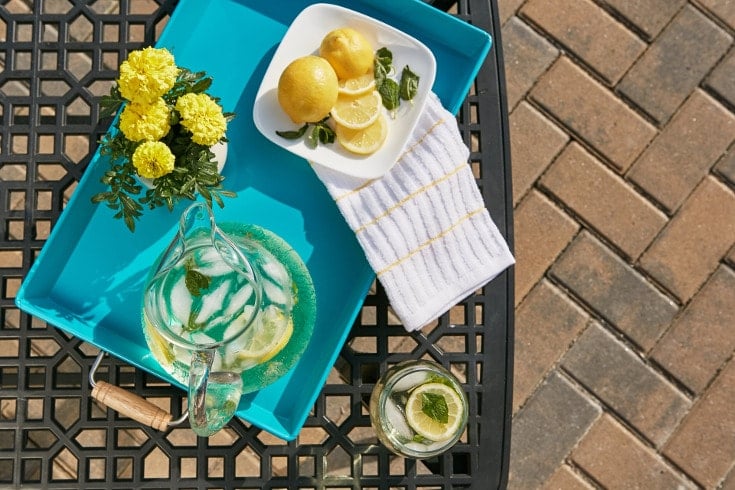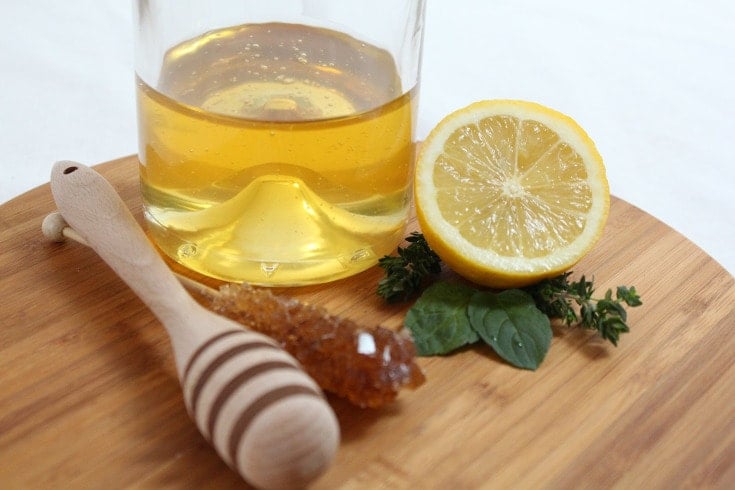
I’ll come out and say. Using lemon in skincare is a bad and dangerous idea. I don’t care what that Tik Tok guru says or how many DIY recipes with lemon you stumbled onto on Pinterest, lemon is not a friend of your skin.
This comes from someone who is obsessed with lemons. I love a cooling lemonade in summer. A lemon cheesecake at the end of a special dinner. A whiff of citrusy perfume to remind you summer’s on its way. But, I would never use lemon in skincare. Putting lemons on your skin is just asking for trouble.
I know, it’s hard to believe. Lemons are natural. Loaded with antioxidants. A key ingredient in plenty of DYI beauty recipes. How can they be bad for your skin? I’ll tell you how. Read on:
Benefits Of Lemon On Skin: Why Do People Think It’s Good?
If so many people are putting lemon juice on their skin, there must be a reason, right? They can’t all be crazy. I get it why lemon is so popular. On the surface, lemon is perfect skincare ingredient. This bright yellow fruit is full of goodies skin loves and can never get enough of:
- Vitamin C: An anti-aging superstar, this vitamin fights the free radicals that cause premature aging, boosts the production of collagen to keep skin firm and elastic, and reduces dark spots and hyperpigmentation. Use it together with sunscreen and it boosts sun protection, too.
- Niacin: Also known as vitamin B3, it has anti-inflammatory properties that can alleviate dry and irritated skin, and reduces hyperpigmentation, too. Plus, it makes skin softer and smoother.
- Citric acid: This is an alpha hydroxy acid (AHA), a family of exfoliants that gently dissolve the “glue” that holds your skin cells together so they can slough off and reveal the brighter, smoother, more even toned skin underneath. Result? Softer, brighter, younger-looking skin.
What does this all mean for skin? Let’s translate this science jargons into real benefits for your skin:
- Antiaging: The antioxidant content of lemons helps you fight free radicals and keep your skin as young as possible for as long as possible.
- Brightening: Vitamin C and citric acid help reduce all kinds of dark spots and hyperpigmentation, including a botched tan job.
Sounds amazing, right? So what’s the problem with lemon in skincare?
Related: The Complete Guide To Vitamin C In Skincare
Why Lemon Juice Is Bad For Skin
Lemon should be amazing for the skin, right? But, there’s a catch (or two):
1. Low Concentration Of Active Ingredients
A lemon is a lemon, right? But, have you ever noticed how some lemons taste more tarty or more acidic than others? There’s a reason for that: even though all lemons are made up of the same compounds, their quantity changes.
This depends on a lot of different factors, like the variety of lemon, where it was grown, the time of year, if it was refrigerated or not after it was picked up, and how long it’s been sitting at the grocery store…
How much goodies does that lemon in your kitchen really contain? Enough to be effective? Or too much? Michelle of Lab Muffin points out that “in a typical sample of lemon juice, you’ll find 0.04% ascorbic acid, 5% citric acid and 0.0001% niacin. Normally in skincare, serums will have 5-15% ascorbic acid, 2-15% AHA, and 2-10% niacinamide. So in lemon juice, you only really get a decent amount of citric acid.” Not enough benefits for the potential side effects…
FYI, citric acid may very well be what irritated that woman’s skin. It’s an exfoliant and if you exfoliate too much, you end up irritating or inflaming your skin – and that’s one of the main causes of dark spots. Just saying…
Want DIY skincare tips that really work? Subscribe to the newsletter below to receive the “5 DIY Skincare Hacks That Really Work” below:
2. Lemon Irritates And Dries Out Skin
Because of its high vitamin C content, lemon is often the top choice for DIY treatments to fight hyperpigmentation. But, lemon juice is highly acidic. It has a pH of just 2. What does this mean?
Well, skin’s natural pH is around 5.5 or 6.5. When you put something on it with a pH as low as 2, you could potentially damage its protective barrier. You know, that wall that keeps moisture in, and germs, pollutants, and all kinds of crap out?
When this barrier is damaged, moisture evaporates out of your skin, leading to dryness and dehydration. Germs and bacteria can get in through the holes in the barrier, causing irritations and redness. It’s not a pretty picture. In an effort to reduce dark spots and even out the skin tone, you’ve now irritated and dried out skin. Not the smartest move…
Related: How To Strengthen Your Skin’s Protective Barrier (And Why It Matters)
3. Lemons Can Cause Blistering Burns
Did you know that fruits, like lemons, are made up of thousands of different substances? Some of them are good, others not so much. Lemons, for example, contain fluranocourmarins and psoralens. All you need to know is, when exposed to sunlight, these compounds can irritate and even burn the skin!
This condition has a name, Phytophotodermatitis (or PPD for short), and is more common than you think. PPD is tricky, because it doesn’t always show up immediately. But, it will – eventually. When it does, you’ll recognize it: you’ll see red rashes and brown discolourations that worsen the hyperpigmentation you were trying to correct. Ironic, isn’t it?
Oh, in case you were wondering, these phototoxic compounds can be removed from citrus oils during the processing phase, so not all of them are necessarily bad. But, there’s no way you can remove them at home. So, never ever put lemons on your skin and then go out into the sun unprotected. Never.
4. Lemon Can Worsen Hyperpigmentation
One of the main reasons people use lemons in skincare is to lighten their dark spots. The combination of exfoliating citric acid and Vitamin C has been proven to reduce hyperpigmentation – when used correctly.
So it’s ironic that using lemon juice on your skin can cause chemical leukoderma, a fancy way of saying that dark patches of skin can lose their pigment. In other words, you end up with uneven light patches on your skin!
A 61 year old woman ended up with patches on her skin after using a lemon toner because it had reduced the dark pigment in her skin too much. Instead of fading away the dark spots she already had, DIY lemon juice gave her more!
We don’t know exactly why lemon juice does this. It could be the low pH of lemon. Only high concentrations of chemical peels have such a low pH. They’re administered by a professional so they can be neutralised after a few minutes. Left on the skin for hours, and exposed to sunlight, they can lead to all kinds of problem. Don’t do it!
What Should You Use To Brighten Skin Instead?
I caution you against using DIY lemon juice recipes for your skin. Even when they work, there are safer way to lighten those dark spots. Here are a couple:
1. Use A Vitamin C Serum
Vitamin C is the key ingredient in lemons and has the same brightening benefits for the skin – without the harsh side effects (unless your skin is super sensitive). For best result, use a serum that contains 15% L-Ascorbic Acid, 1% Vitamin E, and 0.5% Ferulic Acid. L-Ascorbic Acid is the most effective form of Vitamin C and the other antioxidants support it, so that it works better and faster.
BEST PICKS:
- Drunk Elephant C-Firma Day Serum ($80.00/£67.00): This CEF serum contains marula oil to moisturise dry skin, but that gives it a slightly sticky texture. Available at Cult Beauty, Sephora and SpaceNK
- Paula’s Choice C15 Booster ($49.00): A powerful CEF serum that brightens skin and fights premature aging. Available at Sephora, Nordstrom and Paula’s Choice
- Skinceuticals CE Ferulic ($166.00): The original CEF serum, it’s still the gold standards on the market to prevent wrinkles, boosts sun protection, and brighten the complexion. Available at Dermstore
2. Exfoliate With AHAs
Citric acid is a member of the Alpha Hydroxy Acids (AHAs) family, a group of exfoliants that works by dissolving the glue that holds skin cells together. Those cells on the surface of the skin are usually the darkest and most damaged. Shed them off and you exposed the more even-toned cells underneath. Overtime, this process helps to fade away dark spots.
BUT… citric acid is rarely used in exfoliants. Why? It’s the LEAST effective member of the AHAs family. If you’re serious about fading dark spots, opt for Glycolic Acid. It has a smaller molecular structure that allows it to deeply penetrate skin, so it works better and faster. The catch? It can be irritating when you first start using it. Every other night is more than enough.
BEST PICKS:
- Drunk Elephant T.L.C. Framboos Glycolic Night Serum ($90.00): This exfoliant contains two exfoliants. Glycolic Acid to fade away dark spots and Salicylic Acid to unclog pores. Available at Cult Beauty, Sephora and SpaceNK
- Paula’s Choice Resist Daily Smoothing Treatment with 5% AHA ($33.00): A wonderful low strength Glycolic Acid exfoliant that makes skin softer, smoother, and brighter. Available at Paula’s Choice and Selfridges
- The Ordinary Glycolic Acid 7% Toning Solution (£6.80): A gentle, no-frills Glycolic Acid exfoliant for people on a budget. Available at Beauty Bay and Cult Beauty
The Bottom Line
Lemons are delicious little treats, but when it comes to skincare, they’re too unpredictable. They can help fade away dark spots, but they can also cause them! Plus, they’re irritating, drying, and not even as effective as proper skincare products. The verdict is clear: the risks far outweigh the benefits. Don’t do it!




Totally agree! It’s a shame people jump the gun on these sort of DIY experiments without knowing the possible consequences! Another thing you should not do if put apple cider vinegar on your face.
About drinking it, did you know that by doing that you’ll have to reapply your sunscreen more often?Just by having lemon juice in your water reduces your protection by 33%. Just thought that was interesting.
H, I agree. Lots of DIY tips on the internet are dangerous, and it’s so worrying that people just follow them without doing more research. They end up doing their skin so much harm.
Really? Do you have the link to the study? Frankly, I find it a bit odd. If you drink lemon juice throughout the day, you may have to apply it more often, but if you have a glass in the morning and apply your sunscreen afterwards, shouldn’t you be fine?
I don’t remember exactly whare I read it. I believe I read it in some fashion magazine like Vogue,Ellie, or Seventeen while waiting on somebody… I dunno.
I did read here that frequently drinking carrot juice boost your drinking carrot juice can protect your skin from the sun. http://www.naturalhealth365.com/protect-your-skin-1083.html/
H, oh I see.
Plenty of veggies and fruits can boost sun protection, but none works as well, or is a substitute for, sunscreen, Still, It’a always a good idea to eat a diet rich in them. 🙂
Totally agree. Still though,why not eat some of those amazing super foods that give your body some sun protection,a host of antioxidants as well as health benefits? People unfortunately often miss spots/don’t reapply often enough when applying sunscreen. What’s not to love about extra UVA protection.Did you know you can buy antioxidants in capsule form to consume such as astaxanthin ? It also helps people who workout recover faster.Did you know it is 500x more effective than vitamin E, 10x more than beta carotene,and 4 x more effective than lutein in various antioxidant capacities according to the ORAC values of antioxidants.
Have you ever heard of Heliocare? ( not astaxathin)It’s consumable sun protection (well not to be relied on solely for sun protection) recommended by dermatologists . Link: http://www.heliocare.com/ Here’s another (and better with astaxithan) and doesn’t have the artificial colors… : http://www.sunsaferx.com/facts/sunsafe-rx-supplement-facts/
One by another company: http://www.puritan.com/puritans-pride-brand-0102/ppfernblock250mg30cap-054996
Yikes! Sorry for that pet-peeve (since you’re an editor)! I left out a few question marks!
H, I agree. We can only benefit from a diet rich in antioxidants. And thanks for the links. I’ll go check them out now.
I have burns on my face caused by lemon juice.I needed a quick trick to make my pimples disappear and I trtried it.DO NOT DO THAT!It hurts so much and look terrible.What should I do to repair?
Carmela, oh no! How awful! How is your skin doing now? If it is still bad, you should consult a dermatologist. In the meantime, use a simple, soothing cream, like aloe vera.
Anything Acidic has great potential to damage skin. If I’m really tempted to try one of these diy suggestions on internet, I would try them on an area on my arm that is not very visible and also cut the amount in half or less since I have very sensitive skin and multiple allergies. I can’t even drink lemon juice so I probably will not ever try treating my face with it. BTW, thank you, Gio, for your great post and sharing the above info.
Zoe, I agree. I wouldn’t use anything this acidic on the skin, especially if it’s sensitive. It just spells trouble.